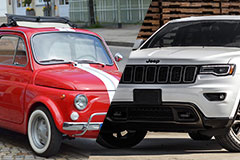Small Car Versus Big Car - Which Is Better to Drive? - Vol.398
If you're shopping for a new car, size really matters. Many buyers ask themselves whether a small car is better than a big one. However, the answer really depends on your needs and driving habits.
For many people, a small car is a more inspired choice. But not for all. Learn all you need to know about the small car versus big car debate to make an informed choice.

A Few Things to Remember
You may have experienced firsthand that parking a small car in an urban setting is a lot easier. With a small car, you can squeeze yourself in narrow spaces without bumping into other cars. If parking is a problem in your city - and in most cities it is - then a small car can make a big difference in your life.
Another thing to remember is that the more the car weighs, the more power it needs to be easy to handle. That may not impact the driving experience itself, but it surely impacts your finances since powerful engines burn more gas.
That said, small doesn't necessarily mean less powerful. Many manufacturers are putting powerful engines into small cars, packing more horsepower than you'd think into cars like the Mini or the Volkswagen Golf. Don't be surprised if the difference in horsepower between a good-quality small car and an average quality big car is negligible.
Benefits of a Small Car
Small cars come with a host of advantages that make them easier to drive in most cities. Here are some of the key benefits of a small car:
- Easy parking due to small size - fits where bigger cars don't
- Streamlined design often means better handling on the road
- Faster acceleration since they weigh less
- Better fuel efficiency, which could mean significant savings on gas
- More affordable insurance plans
- Lower price tag
- Lower maintenance costs
Benefits of a Big Car
Big cars have their own set of advantages. Here's a summary.
- More room in the car, which means that passengers can stretch their legs even when the car is full (well, at least figuratively)
- Greater space in the trunk
- More powerful engine, which could make the car easier to drive on rougher roads
- Smoother rides on the highway and on other fast roads
- Possibly more interior features including larger speakers and navigation
- Greater safety on the road, since big cars are, at least in theory, more impact-resistant than small cars
The Bottom Line
Will you drive mostly in the city? If yes, then a small car will be easier to park and handle in tight spaces. Also, you'll be able to take sharper turns and overall have a better control over the car. In some cases, you'll also be able to cut your way faster through heavy traffic, by making the most of the spaces between other drivers. All these benefits can be especially important for a new or inexperienced driver.
But if space in the trunk is something you need on a daily basis, and you don't mind some extra horsepower, a big car could be right for you. Don't forget though that driving a big car can seem at times like riding a stallion. You'll have to tame those turns and be careful in heavy traffic areas. With a big car, the road seems a bit smaller, and that can be both an advantage and a disadvantage.
In the end, you shouldn't base your choice entirely on size. But when comparing cars, do consider carefully car size as it relates to your daily driving needs.